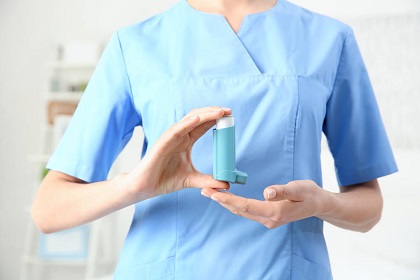Search
Related Articles

How to use Accuhaler
Step 1: Open• Hold your Accuhaler in one hand with the dose-counter
How to Use a Metered-Dose Inhaler and a Spacer
WHAT YOU NEED TO KNOW:What is a metered-dose inhaler and a spacer?A
Athletes’ Cardiorespiratory Functional Assessmen
Have you ever felt discomfort during exercise like shortness of brea
What is pneumonia?
Pneumonia is an infection in your lungs caused by bacteria, viruses, fungi, or parasites. You can become infected if you come in contact with someone who is sick. You can get pneumonia if you recently had surgery or needed a ventilator to help you breathe. Pneumonia can also be caused by accidentally inhaling saliva or small pieces of food. Pneumonia may cause mild symptoms, or it can be severe and life-threatening.
What increases my risk for pneumonia?
• A cold or the flu
• Health conditions, such as heart or lung disease
• A weakened immune system caused by HIV, cancer, or steroid use
• Recent hospitalization
• Smoking
• Excess alcohol use
• Older age
What are the signs and symptoms of pneumonia?
• Fever or chills
• Cough
• Shortness of breath or rapid breathing
• Chest pain when you cough or breathe deeply
• Headache
• Vomiting
• Fatigue or confusion
How is pneumonia diagnosed?
Your healthcare provider will listen to your lungs. Tell him or her if you have other health conditions. Give your provider a complete list of all medicines you have taken recently. You may need any of the following:
• Blood tests may show signs of an infection or the bacteria causing your pneumonia. Blood tests can also show how much oxygen is in your blood
• A chest x-ray may show signs of infection in your lungs
• Pulse oximetry measures the amount of oxygen in your blood
• A mucus sample is collected and tested for the germ that is causing your illness. It can help your healthcare provider choose the best medicine to treat the infection
How is pneumonia treated?
• Antibiotics treat pneumonia caused by bacteria
• Acetaminophen decreases pain and fever. It is available without a doctor's order. Ask how much to take and how often to take it. Follow directions. Read the labels of all other medicines you are using to see if they also contain acetaminophen, or ask your doctor or pharmacist. Acetaminophen can cause liver damage if not taken correctly. Do not use more than 4 grams (4,000 milligrams) total of acetaminophen in one day
• NSAIDs, such as ibuprofen, help decrease swelling, pain, and fever. This medicine is available with or without a doctor's order. NSAIDs can cause stomach bleeding or kidney problems in certain people. If you take blood thinner medicine, alwaysask your healthcare provider if NSAIDs are safe for you. Always read the medicine label and follow directions
• Airway clearance techniques are exercises to help remove mucus so you can breathe more easily. Your healthcare provider will show you how to do the exercises. These exercises may be used along with machines or devices to help decrease your symptoms
• Respiratory support is given to help you breathe. You may receive oxygen to increase the level of oxygen in your blood. You may also need a machine to help you breathe
How can I manage my symptoms?
• Rest as needed. Rest often while you recover. Slowly start to do more each day
• Drink liquids as directed. Ask how much liquid to drink each day and which liquids are best for you. Liquids help thin your mucus, which may make it easier for you to cough it up
• Do not smoke. Avoid secondhand smoke. Smoking increases your risk for pneumonia. Smoking also makes it harder for you to get better after you have had pneumonia. Ask your healthcare provider for information if you currently smoke and need help to quit. E-cigarettes or smokeless tobacco still contain nicotine. Talk to your healthcare provider before you use these products
• Use a cool mist humidifier. A humidifier will help increase air moisture in your home. This may make it easier for you to breathe and help decrease your cough
• Keep your head elevated. You may be able to breathe better if you lie down with the head of your bed up
How can I prevent pneumonia?
• Prevent the spread of germs. Wash your hands often with soap and water. Use gel hand cleanser when there is no soap and water available. Do not touch your eyes, nose, or mouth unless you have washed your hands first. Cover your mouth when you cough. Cough into a tissue or your shirtsleeve so you do not spread germs from your hands. If you are sick, stay away from others as much as possible
• Limit alcohol. Women should limit alcohol to 1 drink a day. Men should limit alcohol to 2 drinks a day. A drink of alcohol is 12 ounces of beer, 5 ounces of wine, or 1½ ounces of liquor
• Ask about vaccines. You may need a vaccine to help prevent pneumonia. Get an influenza (flu) vaccine every year as soon as it becomes available
When should I seek immediate care?
• You cough up blood
• Your heart beats more than 100 beats in 1 minute
• You are very tired, confused, and cannot think clearly
• You have chest pain or trouble breathing
• Your lips or fingernails turn gray or blue
When should I contact my healthcare provider?
• Your symptoms are the same or get worse 48 hours after you start antibiotics
• Your fever is not below 99°F (37.2°C) 48 hours after you start antibiotics
• You have a fever higher than 101°F (38.3°C)
• You cannot eat, or you have loss of appetite, nausea, or are vomiting
• You have questions or concerns about your condition or care
CARE AGREEMENT:
You have the right to help plan your care. Learn about your health condition and how it may be treated. Discuss treatment options with your caregivers to decide what care you want to receive. You always have the right to refuse treatment.
©2017 Truven Health Analytics LLC All illustrations and images included in CareNotes®are the copyrighted property of A.D.A.M., Inc. or Truven Health Analytic
Click the link for more information on Respiratory Medicine Clinical Service








